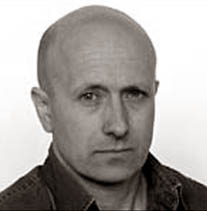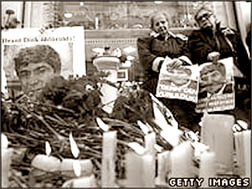Dangers grow for journalists
 UN World Press Freedom Day, to be marked on Thursday, has an alarming
message - that too many journalists are being killed for what they do.
If truth is killed, the whole world will suffer, writes William Horsley,
head of the Association of European Journalists in the UK. UN World Press Freedom Day, to be marked on Thursday, has an alarming
message - that too many journalists are being killed for what they do.
If truth is killed, the whole world will suffer, writes William Horsley,
head of the Association of European Journalists in the UK.
"People sometimes pay with their lives for saying out loud what they
think." Those were the words of Anna Politkovskaya, the Russian
journalist shot dead by an unknown assassin in the lift of her Moscow
apartment block on 7 October last year.
The killer was seen on a CCTV recording, wearing a baseball cap but
not hiding his face.
Anna Politkovskaya was a fierce critic of President Putin's
government, and had received many death threats. When she died she was
working on an article alleging torture by special forces under the
Chechen Prime Minister Ramzan Kadyrov. Press freedom is like the canary
in the coalmine Jennifer Windsor Freedom House.
As in the cases of a dozen other murders of prominent Russian
journalists since 2000, the investigation into her killing has so far
led nowhere.
On 19 January this year Hrant Dink, a well-known Armenian Turkish
writer and journalist, was shot dead in a street in Istanbul.
He had received threats from Turkish nationalists for writing about
the mass killings of Armenians by Ottoman Turks in World War I, and been
found guilty last year on a criminal charge of "insulting Turkishness".
Those deaths of famous journalists provoked an international storm.
And the kidnapping of the BBC correspondent Alan Johnston in Gaza in
March has again focussed attention on the grave threats to journalists
in conflict zones.
But journalists are being killed, attacked or threatened in record
numbers. Most acts of violence go unreported.
List of shame
 In March, a study by the International News Safety Institute (Insi),
a coalition of media organisations and human rights groups, said 1,000
journalists had been killed around the world in the past 10 years. In March, a study by the International News Safety Institute (Insi),
a coalition of media organisations and human rights groups, said 1,000
journalists had been killed around the world in the past 10 years.
The most dangerous place was Iraq, with 138 killed. Russia came next,
with 88 deaths.
Insi's director, Rodney Pinder, said: "In many countries, murder has
become the easiest, cheapest and most effective way of silencing
troublesome reporting."
On World Press Freedom Day this year, campaigners say the most deadly
threat to media freedom is violence targeting journalists just because
the things they may expose are unwelcome.
"Press Freedom suffered a continued global decline in 2006." That is
the conclusion of this year's global survey by Freedom House, a New
York-based campaigning group.
It rated Burma, Cuba, Libya and North Korea as the world's worst
violators of media freedom. As a region, it says the Middle East and
North Africa has the harshest restrictions.
And a new report by the independent Committee to Protect Journalists
has published a "roll of dishonour" of places where it says press
freedom has deteriorated over the past five years.
Ethiopia is at the top of the list: 18 journalists have reportedly
been jailed there, and the CPJ says private newspapers are driven to
exercise self-censorship.
Next come Gambia (where one newspaper editor was murdered), Russia,
the Democratic Republic of Congo, Cuba, Pakistan, Egypt, Azerbaijan,
Morocco and Thailand.
Intolerance and rigid laws
The Council of Europe says journalists in several of its 46
member-states fear for their lives.
The Council's parliamentary assembly has protested about brutal
attacks on journalists in Ukraine (where the journalist Georgiy Gongadze
was found beheaded in the year 2000), as well as Azerbaijan and Moldova.
And Europe still suffers the effects of religious intolerance, which
was seen in last year's uncontrolled protests against a set of Danish
cartoons depicting the prophet Mohammed.
The Council of Europe condemns Iranian religious leaders for issuing
"death decrees" against a Frenchman and two Azerbaijanis who wrote about
Islam.
In the former Yugoslavia, too, journalists have been the targets of
sectarian violence while investigating alleged war crimes, many years
after the conflict ended.
The Paris-based World Association of Newspapers raises the alarm over
anti-terrorism laws which it says are stifling media freedom. Today it
denounces many governments for failing to protect the press from their
effects.
The association says state secrets laws have been used to convict
journalists in Russia and China. In Germany, the Netherlands and the UK,
too, journalists have faced trial for violating security laws.
Bad for everyone
And the media themselves are not immune from criticism.
In America, the networks and big news organisations are being asked:
why did they fall for the Pentagon's false story about the heroism of
Private Jessica Lynch in Iraq? And where was their proper scrutiny of
the US government over the "war on terror"?
Commercial pressures have also brought new ownership monopolies and
forced Western news companies to cut their foreign news staff.
That has boosted an exciting alternative, the blogosphere. The
internet seems to promise unlimited access to information for people
everywhere.
China and some other countries have moved quickly to curtail their
people's ability to use it freely.
There is some good news for the embattled media.
Last December the UN Security Council passed Resolution 1738,
requiring armies and governments to protect journalists like other
civilians in war zones.
And the Organisation for Security and Cooperation in Europe is
pressing its 55 member-states to live up to their promises.
Miklos Haraszti, the OSCE's Representative on Freedom of the Media,
challenged the Russian authorities over Anna Politkovskaya's murder,
saying Moscow allowed a "climate of impunity" to develop which may have
led her killers to believe they would go unpunished.
"Press freedom is like the canary in the coalmine," says Jennifer
Windsor of Freedom House.
Assaults on the media are inevitably followed by assaults on other
democratic institutions.
BBC NEWS
|
